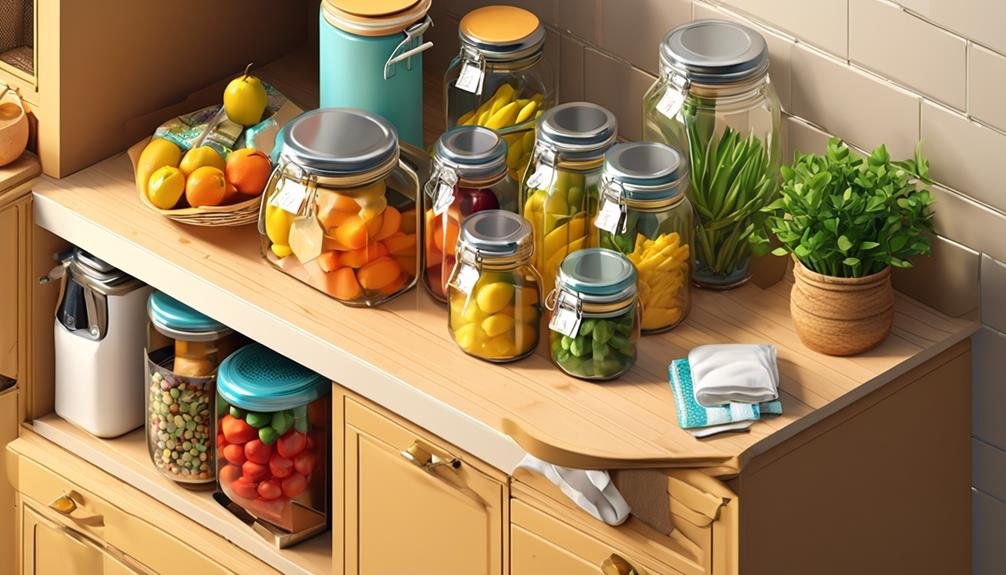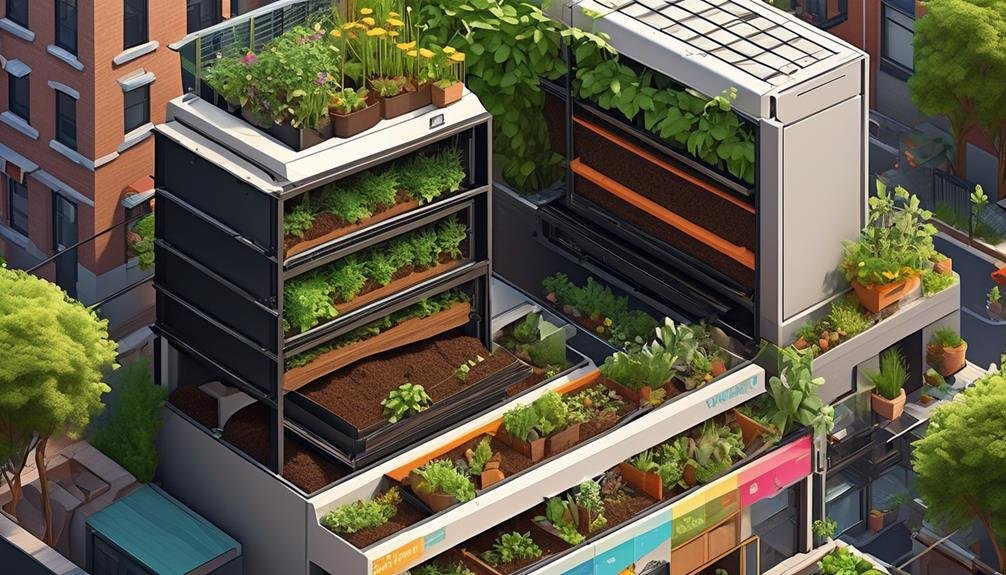Are you tired of seeing your small, shared apartment cluttered with single-use plastic and waste? Imagine a scenario where you and your roommates have successfully transformed your living space into a zero waste haven.
Curious to know how you can achieve this? Well, look no further because in this discussion, we will provide you with practical advice and strategies to help you navigate the challenges of going zero waste in a small, shared apartment.
So, if you're ready to create a sustainable and eco-friendly living environment, keep reading to discover the secrets to success.
Key Takeaways
- Assess shopping habits and prioritize necessary items to reduce consumption.
- Embrace reusable alternatives such as water bottles, travel mugs, cloth bags, and silicone food wraps.
- Implement a recycling system with designated areas for bins and educate roommates on sorting.
- Compost in small spaces using compact bins and the appropriate method, avoiding certain materials.
Evaluate and Reduce Your Consumption
To minimize waste in your small, shared apartment, it's crucial to actively evaluate and reduce your consumption. By being mindful of what you bring into your space, you can make significant progress towards a zero waste lifestyle.
Start by assessing your shopping habits. Consider the items you regularly purchase and ask yourself if they're necessary. Can you find alternative ways to meet your needs without generating waste? Focus on buying only what you truly need and avoid impulse purchases. Additionally, try to prioritize products with minimal packaging or opt for package-free alternatives.
Another area to evaluate is your food consumption. Plan your meals carefully to avoid food waste and buy in bulk to reduce packaging waste. Consider composting your food scraps to further minimize waste.
Finally, pay attention to your energy and water consumption. Turn off lights and unplug electronics when not in use, and be mindful of water usage while washing dishes or taking showers.
Adopt a Minimalist Lifestyle
Embrace minimalism to simplify your lifestyle and reduce waste in your small, shared apartment. Adopting a minimalist lifestyle means consciously choosing to live with less, focusing on what truly matters to you. By decluttering your space and minimizing your belongings, you can create a more organized and serene environment.
Start by evaluating your possessions and getting rid of items you no longer need or use. Consider donating or selling them to reduce waste and give them a second life. When purchasing new items, opt for high-quality, durable products that will last longer and reduce the need for replacements.
In the kitchen, embrace minimalism by reducing single-use items such as disposable cutlery and plastic wrap. Invest in reusable alternatives like stainless steel cutlery and beeswax wraps.
In the bathroom, switch to multi-purpose products that serve multiple functions, reducing the number of bottles and containers cluttering your space. Consider using shampoo bars, refillable soap dispensers, and bamboo toothbrushes to minimize waste.
In your shared living spaces, encourage your roommates to embrace minimalism as well. Share common items like cleaning supplies and kitchen appliances to minimize duplication and reduce waste.
Embrace Reusable Alternatives

Reduce waste and make sustainable choices by incorporating reusable alternatives into your daily routine. Embracing reusable alternatives is a simple yet effective way to reduce the amount of waste you generate in your small, shared apartment. Start by replacing single-use items with their reusable counterparts.
Swap out disposable plastic water bottles for a reusable stainless steel or glass bottle. Instead of using disposable coffee cups, invest in a reusable travel mug. Ditch the plastic grocery bags and opt for reusable cloth bags. These small changes can have a big impact on reducing your waste.
Another area where you can embrace reusable alternatives is in the kitchen. Instead of using plastic wrap or aluminum foil to cover leftovers, use reusable silicone food wraps or glass containers with lids. Bring your own reusable cloth bags or produce bags when you go shopping for groceries. These alternatives not only reduce waste, but they also save you money in the long run.
In the bathroom, consider using a reusable razor instead of disposable ones. Replace single-use cotton balls or pads with reusable cotton rounds or washable makeup remover pads. Switch to a menstrual cup or reusable cloth pads instead of disposable tampons or pads. These choices aren't only more sustainable but also healthier for your body.
Incorporating reusable alternatives into your daily routine can seem overwhelming at first, but with a little planning and commitment, it becomes second nature. Start small and gradually make changes as you become more comfortable. Remember, every small step you take towards zero waste in your small, shared apartment makes a difference.
Implement a Recycling System
Create an organized recycling system in your small, shared apartment to effectively reduce waste and promote sustainability. Implementing a recycling system not only helps you contribute to a cleaner environment but also encourages your roommates to participate in the zero waste journey. Here's a practical approach to setting up a recycling system in your apartment:
| Recycling Material | Collection Method | Disposal Method |
|---|---|---|
| Paper | Blue bin | Curbside pickup |
| Plastic | Yellow bin | Curbside pickup |
| Glass | Green bin | Recycling center |
First, designate a specific area in your apartment for recycling bins. Place a blue bin for paper, a yellow bin for plastic, and a green bin for glass. Clearly label each bin to avoid confusion.
Educate your roommates on what materials are recyclable and how to properly sort them. Use visual aids, such as posters or stickers, to provide guidance.
Regularly empty the recycling bins and separate the materials into different bags or containers. Take the paper and plastic bins to the curbside for pickup. For glass, find the nearest recycling center and drop off the materials accordingly.
Composting in a Small Space

To continue your zero waste journey in your small, shared apartment, let's explore how to effectively compost in limited space. Composting is a great way to reduce waste and create nutrient-rich soil for your plants.
Here are some tips to help you compost in a small space:
- Use a small compost bin: Look for a compact compost bin that fits in your kitchen or balcony. Opt for one with a tight-fitting lid to prevent odors and pests.
- Choose the right composting method: If you have outdoor space, consider a traditional compost pile or a worm bin. If you don't have outdoor space, try vermicomposting using red worms in a small bin.
- Compost the right materials: Stick to compostable materials such as fruit and vegetable scraps, coffee grounds, eggshells, and yard waste. Avoid adding meat, dairy, oily foods, and pet waste as they can attract pests.
Remember to maintain a good balance of green (nitrogen-rich) and brown (carbon-rich) materials in your compost to ensure proper decomposition. Turn the compost regularly to speed up the process.
With these tips, you can successfully compost in your small space and contribute to a greener planet.
Engage and Educate Your Roommates
Get your roommates involved in your zero waste journey by engaging and educating them about the benefits of reducing waste. Encourage open conversations about sustainability and explain why it's important to you. Start by discussing the environmental impact of waste and how it contributes to pollution and climate change. Share statistics and facts to make your point more compelling.
Next, explain the financial benefits of reducing waste. Let your roommates know that by embracing a zero waste lifestyle, you can save money by buying less and reusing items instead of constantly buying new ones. Show them how small changes, like using reusable bags and water bottles, can add up to significant savings over time.
Additionally, provide practical tips and suggestions for reducing waste in your apartment. Offer to set up a composting system or a recycling station, and show them how to properly sort and dispose of waste. Demonstrate the use of reusable products, such as cloth napkins, menstrual cups, and reusable food storage containers. Encourage your roommates to join you in shopping at bulk stores and farmers markets to reduce packaging waste.
Remember to be patient and understanding. Change can be challenging, especially when it comes to ingrained habits. Offer support and be willing to answer questions or provide guidance along the way.
Frequently Asked Questions
How Can I Reduce My Waste When It Comes to Personal Care Products and Toiletries?
To reduce waste with personal care products and toiletries, opt for package-free alternatives like shampoo bars and toothpaste tablets. Choose refillable containers and buy in bulk. Consider making your own products using natural ingredients.
What Are Some Tips for Reducing Waste in the Kitchen, Especially When It Comes to Food Packaging?
To reduce waste in the kitchen, focus on minimizing food packaging. Buy fresh produce and bulk items, use reusable containers, and make homemade meals. It's a simple way to make a big impact.
Are There Any Eco-Friendly Alternatives to Single-Use Plastic Bags?
There are many eco-friendly alternatives to single-use plastic bags. Options such as reusable cloth bags, mesh produce bags, and silicone food storage bags are all great choices to reduce waste.
How Can I Dispose of Electronic Waste Responsibly in a Small Apartment?
To dispose of electronic waste responsibly in a small apartment, you can research nearby drop-off locations or recycling programs. They will handle the recycling process for you, ensuring that your e-waste doesn't harm the environment.
Are There Any Suggestions for Reducing Waste When It Comes to Clothing and Fashion Choices?
To reduce waste in clothing and fashion choices, try thrifting or swapping clothes with friends. Mend and repair items instead of buying new ones. Opt for sustainable materials and brands. Donate or recycle unwanted clothes.
Conclusion
In conclusion, going zero waste in a small, shared apartment may seem challenging, but with the right mindset and habits, it's definitely achievable.
By evaluating and reducing your consumption, adopting a minimalist lifestyle, and embracing reusable alternatives, you can make a significant impact on reducing waste.
Implementing a recycling system and composting in a small space are also important steps towards going zero waste.
Additionally, engaging and educating your roommates about the importance of reducing waste can help create a more sustainable living environment.
Remember, every small step counts towards a more sustainable future.



